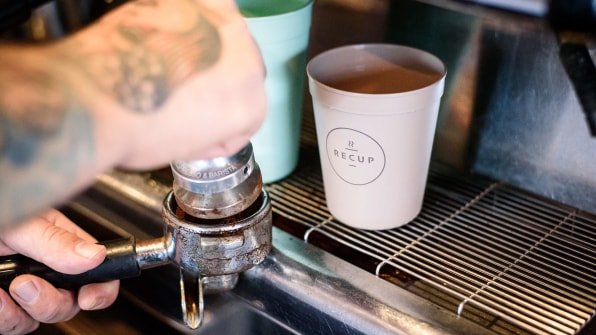Starbucks, McDonald's, and other major fast food brands are closely following some of the world’s top sustainability researchers in their quest to revolutionize the takeout cup.
The NextGen Cup Challenge seeks to replace the prevailing paper takeout cup, which is difficult to recycle because of a polyethylene lining that allows cups to withstand and regulate temperatures and prevent moisture from beading the outside.
If a viable cup is developed and can be scaled, the more than 250 billion single-use cups that end up in landfills each year could could be replaced with a recyclable, compostable, or otherwise sustainable alternative.
Take Action: Call on Businesses to #UnplasticthePlanet by Reducing Their Plastic Packaging Waste
The challenge is organized by the Closed Loop Partners’ Center, a consortium of some of the world’s top brands that are working to develop closed loops of production and consumption to reduce pollution and conserve resources.
The judges of the competition have selected 12 prototypes that will receive additional funding and guidance.

The winners can be grouped into three categories, according to Fast Company.
In the first group, researchers are working to find an alternative to the polyethylene lining with something that’s recyclable or compostable. The next group is seeking to develop paper composite cups that don’t even need a lining, and the final group is developing reusable cups that can be collected after use.
Read More: Why Global Citizen Is Campaigning to Reduce Plastic Waste in the Oceans
The cups that show the most promise will be moved to a market phase in September, when they will be sampled by everyday people.
Throughout this process, brands will be testing the cups to see if they meet various criteria.
“There’s a whole host of things we would be looking at from a performance standpoint, and we’d be using our existing standards and cups as a baseline, and understand if any of these innovations meet the current standard we have or beat those standards,” Marion Gross, the chief supply chain officer for McDonald’s in the United States, told Fast Company.

“We’d also be looking for things like, does the cup have proper rigidity?” Gross added. “Is it strong enough to withstand a period of time sitting in someone’s drink holder in the summer, in the winter when it’s cold? Does it keep the beverage hot for a reasonable amount of time, or does it keep a beverage cold? How does the ice melt? Does it water down the beverage sooner than customers would expect?”
Read More: These Major Companies Just Pledged to Cut Out All Their Plastic Waste
The cup challenge is the latest sign that companies with huge ecological footprints are working to become more sustainable.
As the cup of the future is being formed, other companies are testing out a “milkman model” or consumption in which products are sold in reusable containers are are collected by companies once customers need a refill.